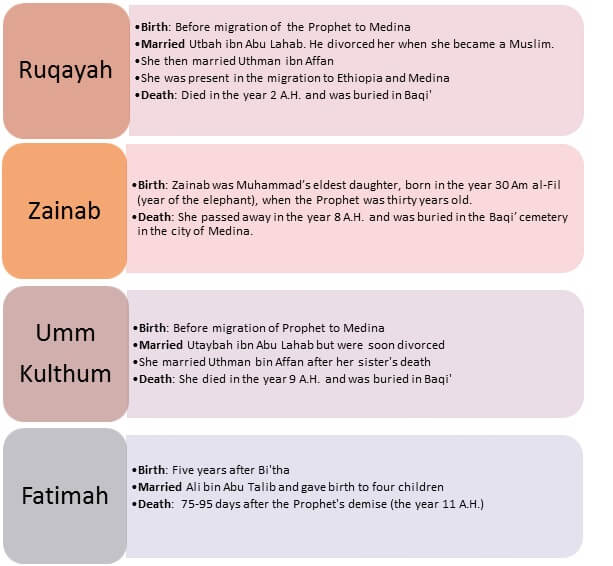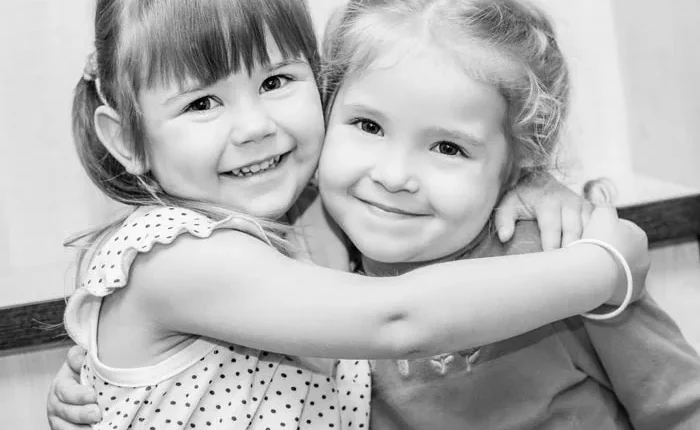How Many Daughters Did Prophet Muhammad (S) Have?
Contents
- 1 What Were the Names of Prophet Muhammad’s Daughters?
- 2 A Brief History of Prophet Muhammad’s Daughters
- 3 Fatimah, the Abundant Blessing
- 4 The Prophet’s Love for His Daughters
- 5 The Death of Prophet Muhammad’s Daughters
- 6 The Best Father-Daughter Relationship
- 7 The Prophet Visited Fatimah Every Day
- 8 Prophet Muhammad, the Kindest Grandfather
- 9 Girls Turned to Be Strong Women in the School of the Prophet (s)
- 10 What the Prophet (s) Considered in the Upbringing of Girls
- 11 What Did the Prophet (s) Say About Girls?
- 12 Fatimah Was Umm Abiha (a Mother for Her Father)
- 13 Like Mother-Like Daughter
- 14 Conclusion
The Noble Prophet (s) had four daughters and three sons. Six of these children were from Lady Khadijah, and he had one son from Mariyah al-Qibtiyya (مارية القبطية), named Ibrahim.
All of the children of Prophet Muhammad (S) died while he still lived except Fatimah. His lineage continued through this heavenly lady. In this article, we will discuss the following topics:
What Were the Names of Prophet Muhammad’s Daughters?
Prophet Muhammad’s daughters were Ruqayyah, Zainab, Umm Kulthum, and Fatimah, born to Lady Khadijah.
Some Muslim scholars such as Abul Qasim Kufi believe that Ruqayyah, Zainab, and Umm Kulthum were Muhammad and Khadijah’s adopted children.1 Others believe that they were all his daughters.
A Brief History of Prophet Muhammad’s Daughters
In the chart below, you will find a brief history of the Prophet’s daughters from the eldest to the youngest, according to the historian Ibn Hisham.2

Fatimah, the Abundant Blessing
Back in the time of jahiliyah (pagan ignorance), the Arabs had no respect for the female gender and considered only their sons as valuable assets. At that time, the Prophet’s sons died one after the other, and his enemies would mock him by telling him that he had no heir to continue his lineage. Then God revealed Surah Kausar to His messenger, giving him the good news of abundant blessings.
This abundant blessing was Fatimah, through whose family, successorship of the Prophet (s), and leadership of the Muslim society continued.
The Prophet’s Love for His Daughters
We would understand the greatness of Prophet Mohammad’s gracious behavior towards his daughters and the girls in his family only when we realize the conditions of girls at that time and the depth of the tragedy of degrading the female gender, killing the girls, and treating women like objects.
In this regard, the sirah (way of life) of the Messenger of Allah (s) is distinguished and unique. After giving birth to Qasim and another son for the Messenger of Allah (S), Lady Khadijah gave birth to four daughters. Whenever the Prophet (S) heard the news of the birth of each of these girls, he was delighted, slaughtered a sheep, and continuously showed his grace to them.
The Death of Prophet Muhammad’s Daughters
He would also become very sorrowful for their death. When Ruqayyah died, the Prophet himself buried her, poured water on her grave, and consoled, soothed, and wiped away Fatimah’s tears with the side of his ‘abā (cloak), as she was sitting next to him and shedding tears for the death of her sister.3
The Best Father-Daughter Relationship
His love for Fatimah was known to all. According to historians, the Messenger of Allah (S) would always kiss Fatimah, put his head on her chest, smell her, and say: “I smell heaven from Fatimah.”4
Whenever Fatimah came to see her father, he would stand up for her, take steps towards her, and seat her in his place.5
When going on a journey, Fatimah was the last one to whom the Prophet (S) said farewell and the first to visit once they returned.6
If you are wondering how a good father is defined in the Quran and hadith, don’t miss our course, “An Islamic guide to man’s role in the family.”
The Prophet Visited Fatimah Every Day
According to the narrations, after Fatimah’s marriage, when her house was some distance away from her father’s, the Messenger of Allah (s) would go a long distance to her house every day to see her and say salām to her. Maybe this was why the Muslims chose a house near the Prophet’s for Fatimah.
Prophet Muhammad, the Kindest Grandfather
The Messenger of Allah (s) was very merciful towards his granddaughter, “Umama (أمامة),” Zainab’s daughter. He loved her a lot, and sometimes the Prophet would give her some gifts that were given to him.
The book Ṭabaqāt narrates: Once, the Noble Prophet (s) received a necklace. He faced his wives and said, “I will give it to the one who is dearer to me.” Then they saw that he gave the necklace to Umama.
Girls Turned to Be Strong Women in the School of the Prophet (s)
The Prophet’s attention to little girls has a separate and sweet story. The girls brought up in the presence of the Noble Prophet (s) received a lot of emotional attention from him. The Noble Prophet (s) helped them grow into fine women with a lot of spiritual strength and a strong personality, which meant they had high self-confidence and the courage to express themselves when needed to defend the truth in different areas of life.
In the prophetic educational system, the teaching of modesty, chastity, humbleness, and humility, among the most appreciated ethical values, especially for women, did not result in abject and weak women.
What the Prophet (s) Considered in the Upbringing of Girls
Prophet Muhammad (S) took into consideration the emotional development of girls in their upbringing. This shows that there is a logical relationship between gender and education. At the same time, just like boys, girls also have some social duties. They have to be brought up in a way to be brave and demand their rights. These future women will have to enjoin what is right and forbid the wrong on needed occasions in their life.
وَالْمُؤْمِنُونَ وَالْمُؤْمِنَاتُ بَعْضُهُمْ أَوْلِيَاءُ بَعْضٍ ۚ يَأْمُرُونَ بِالْمَعْرُوفِ وَيَنْهَوْنَ عَنِ الْمُنْكَرِ
But the faithful, men and women, are comrades of one another: they bid what is right and forbid what is wrong.7
Alternatively, if they are faced with a challenging political situation, they would have to fight for their rights and the rights of other Muslims against the oppressors. It means that they have to have a powerful spiritual ability to carry out this shared human duty.
What Did the Prophet (s) Say About Girls?
According to Prophet Muhammad (s):
- The one who respects a girl and does not bother or insult her has undoubtedly made himself felicitous eternally.
- “As for the one who never prefers his son over his daughter, Allah will make him enter heaven.”8
- Girls are the best of children9 and little girls are blessings who are full of grace and are always there to help.10
- Whenever the Messenger of Allah (s) received the good news of the birth of a girl, he would say: She is a flower, and her sustenance is upon Allah (SWT).”11
Fatimah Was Umm Abiha (a Mother for Her Father)
Looking at the lives of the girls brought up by the Prophet (s), we can see that the Prophet had educated them so that they had enough firmness and self-confidence to fulfill the significant duties they had in the needed time.
An evident example is Lady Fatimah. She was her father’s helper and supporter in her childhood in all the harsh socio-political conditions at the beginning of Islam.
A Short Story
Once, the Messenger of Allah (s) was praying near the Kaaba. A group of people from Quraysh were also sitting there. One of those disbelievers wanted to disrespect the Noble Prophet by having someone place a camel’s rumen on his shoulders while he was prostrating.
Aqabah bin Abi Mu’iet was the one who dared to do such a hideous act when the Noble Prophet (s) was prostrating.
The Prophet (S) remained in prostration, and those unworthy disbelievers laughed so much that they were about to fall to the ground.
Fatimah Rushes to Her Father’s Help
Someone informed Fatimah of what had happened. She hurried to her father while still a small girl and removed the rubbish from her father’s back. She then faced the disbelievers and rebuked them.12
She had gotten this courage and bravery from her mother, father, and educational background.
Like Mother-Like Daughter
History had witnessed the greatness and strength of her mother. At the beginning of Prophet Muhammad’s prophetic mission, a man came to her house and asked for the Prophet (s). The man said: I tied my camel and knocked at the door. Khadijah replied: Who are you? I said: I want to see Muhammad. Khadijah said: Go away. Let Mohammad have shelter in the shade of the house, for you abandoned him, fought with him, and made him stay at home. So go away.13
Conclusion
Prophet Muhammad had at least four daughters who were all born to his first wife, Khadijah. Three of them died while he still lived, and only one of them, Fatimah, survived until his martyrdom. Prophet Muhammad used to honor his daughters and had repeatedly said that others, too, must honor their daughters. He put an end to the inhumane custom of burying daughters alive that the Arabs used to practice. It is interesting to note that Prophet Muhammad’s lineage continued from his daughter, Fatimah, peace be upon her. We should also follow in the footsteps of the Prophet and honor our daughters so that we also achieve felicity like our dear Prophet Muhammad, peace be upon him and his progeny.
References
- Amuli, Banat al-Nabi Am Raba’ibuhu?, 1413 H, p. 77-79.
- Ibn Hisham, Sirah al-Nabawiyyah, vol. 1, p. 190.
- Bahrāni, Abdullāh, Awālim al-‘Ulūm wa al-Ma’ārif wa al-Ahwal.
- Ibid, pp. 176-177.
- ‘Awalim al-‘Ulum, vol. 1, p. 177.
- Ibid, p. 245.
- Quran 9:71 (Qarai)
- Kanz al-‘Ummal, vol. 16, p. 254.
- Bihar al-Anwar, vol. 101, h. 6, p. 91.
- Ibid.
- Bihar al-Anwar, vol. 101, p. 97.
- Al-Sunan al-Kubra, vol. 9, p. 7; Bukhari, Sahih, vol. 1, p. 132.
- Mufid, Muhammad ibn Nu’man, al-Ikhtisas, p. 182; Bihar al-Anwar, vol. 18, p. 99.


Seriously women need to be educated on women rights in Islam
good expalnation